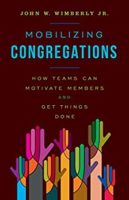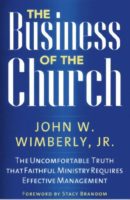In a time when congregations and clergy are dealing with a lot of challenging issues, there is most definitely good news to celebrate. Congregations are more open to change today than at any time in my career as a pastor and consultant. During the pandemic, we learned a great deal about ourselves personally and as congregations. One of the most important and long overdue learnings: we need to change.
Working with many congregations during the pandemic, I have seen a willingness to engage in highly innovative thinking that was often missing in the past. People are not thinking outside the box—they realize there is no box, because the box disintegrated over the past four decades. Congregational leaders who own the good news that people are open to change today will realize that we are freer to initiate transformational strategies than at any other time in recent memory.
As a young pastor, I had the privilege of working in the same building as Rabbi Edwin Friedman. I was an associate pastor in a Presbyterian congregation. Ed, who later wrote Generation to Generation: Family Process in Church and Synagogue, was the rabbi of a Reconstructionist Jewish congregation that met in our building. While I was learning the ropes of ministry, he was learning family systems theory from Murray Bowen at Georgetown University. We had amazing conversations over that six-year period. As we discussed various situations in our congregations, a constant refrain from Ed was, “We know what doesn’t work, John. So let’s stop doing what we know doesn’t work!” It was so simple, so smart, that I was always left wondering, “Why do I keep doing what I know doesn’t work?”
Good News
The good news in 2022 is that many congregations are seeing that they have been doing things that don’t work for a long time and asking, “Why continue doing them?” The pandemic has given congregations permission to start making changes that have been needed for a long time.
As one example, take Sunday school. Numerous congregations are acknowledging what they already knew: trying to compete with Sunday morning soccer is a losing proposition. Because they couldn’t even try to get kids to come to the church during the pandemic, educators started creating ways to bring Sunday school to them by designing virtual learning experiences. As a result, the number of kids engaged in religious education rose significantly in these congregations over the pandemic. These educators are now planning for more virtual learning opportunities for people of all ages.
Another example relates to governance. Every board, committee or team meeting held face-to-face at church requires someone to drive, walk or bike to church. Over the course of a year, the travel time spent going to and from a meeting adds hours to the total time people invest in governance. During the pandemic, we could not meet face to face. But we still needed to meet, so we met virtually.
Today, given their experience with virtual meetings during the pandemic, many members are resisting face-to-face governance meetings and demanding that they be replaced by virtual meetings. This has the side benefit of letting seniors who don’t want to drive at night and parents who can’t leave their kids at night participate. As congregations emerge from the social distancing, members ask, “Do we really need to meet face to face?” The answer, in many instances, is “No.” This frees up time once spent getting to and from meetings for hands-on mission activities, learning experiences, and other forms of ministry.
Don’t Mourn—Strategize!
While most congregations mourn the loss of people attending worship face to face, the most creative congregations have stopped moaning and begun to plan strategically. Five years from now, I expect some churches will have greatly expanded their total weekly worship participation by holding face-to-face worship services on Sunday, growing the number of people worshipping online, and creating non-Sunday worship experiences that bring in yet more people. Congregations offering only face-to-face worship may become yet another relic of the past.
In congregational cultures open to transformational thinking, several areas of congregational life need to be examined:
- Staff designs haven’t changed significantly from models used in the last third of the 20th century. When an associate pastor leaves, too many congregations rush to hire another associate pastor. When a secretary leaves, they hire another secretary. But in our contemporary context for ministry, do we need another associate pastor or secretary? Or would the money be better spent on a communications and marketing staff member, a technical-support staffer or a ministry manager who does what the secretary did, but with a 21st-century spin? We need to reexamine who and what we need in terms of staff.
- Have financial priorities changed over the decades? Or does the budget look pretty much like it did in the late 20th century with increased personnel expense the only major change? As a simple exercise, I recommend pulling out your budget from 1998 to see how different it is from your budget for 2022. How much money today is spent on continually upgrading your technology and communication systems? How much is spent on creating virtual learning experiences versus church-based classes? If we are investing in the same things we did in during the early 21st century, we are not allocating our limited financial resources productively.
- Are we using congregational facilities in new ways to engage the surrounding community? Or are they being used the same way they were thirty years ago? Buildings are one of our most important assets for ministry. They need to be used in ways that advance our strategic goals.
Congregations that spend the current moment of opportunity grieving what has been lost face a grim future. Congregations that recognize the good news that change is possible can seize new opportunities for ministry that God is placing before us. My advice: embrace the good news!
John Wimberly is an experienced pastor and consultant. As a consultant, he has worked with congregations and judicatories on strategic planning, staff designs for the 21st century, and congregational growth as well as financial and administrative management. He has MBA, MDiv, and PhD (theology) degrees. His books focus on effective management and leadership. John believes congregations can have a bright future!




